
The dangers of Europe’s extreme political polarization
Khaled Abou Zahr
In today’s political landscape, the best way I have found to describe the far right and its leftist equivalent is the following: The supporters of a far-right agenda have nostalgia for a time they have never lived through or known, while the far left have rage and indignation against an oppression they have never suffered from.
The far right is dreaming of an old world where family, work and nation were the cornerstones of society — a vision that no longer exists in the West. The far left is rebelling and bringing down old statues and yelling with rage against oppressions that ended centuries ago, such as slavery, and using it to justify the breaking down of current systems and institutions. It is quite a strange situation that resembles the creation of a new virtual reality in politics.
We can clearly notice throughout the West that the divide between the left and the right is becoming wider. Lately, Europe has seen a clear movement toward a bigger representation of right-wing movements and positive election results for right-wing candidates. It is what can be best described as a rise of popular sentiment against “wokeness” and the left’s progressive agenda. This is showing all over Europe. It might have started in Central Europe with Hungary and some neighboring countries, but this shift is now happening almost everywhere. Even France, despite this year’s election results, is witnessing this change. The same applies to the election results in Sweden and finally Italy.
The change in Italy has been marked by a full union or alliance of right-wing parties. There is a clear union with a refusal to be described as extremist groups, and the ballots have been favorable to this change. This might be the biggest difference with France and other countries in Europe, where the right is still fragmented. Until this day, we have been used to an alliance of leftist and green movements that has been able to reap positive results. In France, through the New Ecological and Social People’s Union, the left was able to challenge President Emmanuel Macron’s movement and defeat the right in the last legislative elections without achieving a full majority.
Both sides are completely disconnected, they create their own realities (through social media) and both promise the unachievable
This change has brought, throughout Europe and the West in general, greater violence in the political confrontation between left and right. On both sides, the voices we hear are the extremes, while the voices of reason are being silenced. There is populism on both sides and common sense is being destroyed. The far left and far right both present dangerous choices. When analyzing the situation, we notice both sides are completely disconnected, they create their own realities (through social media) and both promise the unachievable. They share conspiracy theories and create their own stories that their audiences eat up.
If politics should be the art of the possible, it has now become the art of ping pong. There is no real debate or reason. It is about taking the opposite view and, in this game, the left always serves first. “If they are with Ukraine, then we should be with Russia.” “If they are for the vaccines, then we should be against them.” And it goes on and on. One must nevertheless admit that the far-left extremists, who are just as dangerous as those on the right, usually get much better press. Politics boosted by social media has become a mob’s business. More and more, very active small groups are capable of steering the majority to their own will.
And thus, the far left has, in a sense, taken over the agenda of the traditional left. In fact, the right’s political forces are reacting to the left’s actions. The agenda of the far left in the West is — by its own admission — to break and destroy all institutions and the established order and values. This has created fear, especially in a difficult economic and social environment. With a change in the global order, the far right is positioning itself as the last line of defense against this chaos and unknown in an attempt to reestablish order domestically and internationally.
This current situation reminds me of a French political analyst commenting on the election of the first socialist president of the Fifth Republic, Francois Mitterrand, in 1981. He said that this was the end of France as they knew it. He continued by saying that the best way to run a government is to have a right-wing administration with a strong and active counterpower from the left. In this manner, you keep order while also advancing toward a better society.
Thankfully, there are voices of reason on both sides. Unfortunately, they are too decent to be heard or respected. The voices that now lead the debate on both sides are the ones that are the most ferocious. This is in line with the uncertainties the world is going through. Who do you want to defend your interests when things go bad? The nice guy or the ruthless one? This puts Europe in a dangerous and difficult situation, especially with a volatile global geopolitical environment and precarious economic conditions. A full-on confrontation can go beyond virtual reality politics and into the streets.
The writer is CEO of Eurabia, a media and tech company
